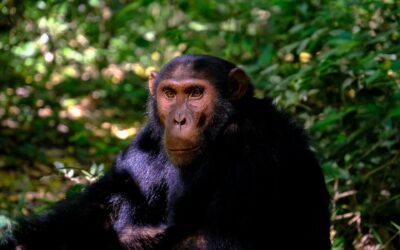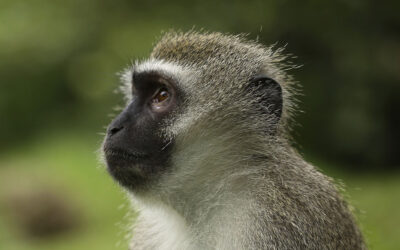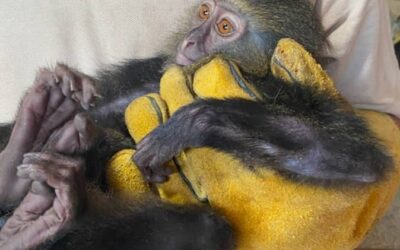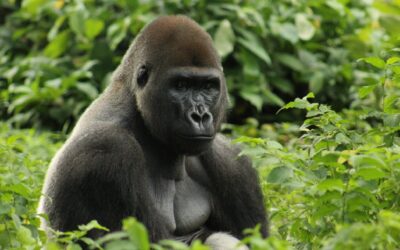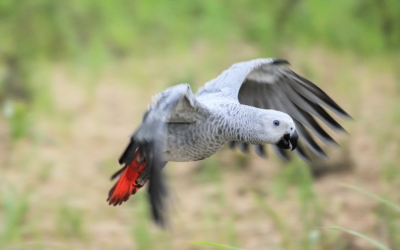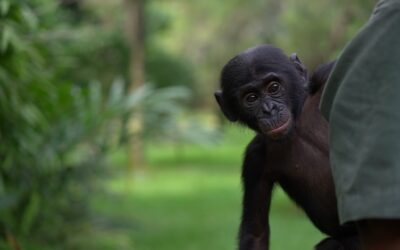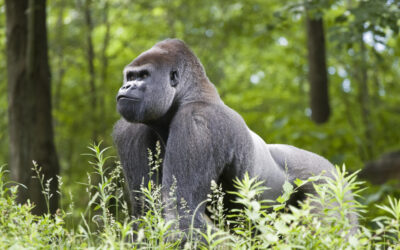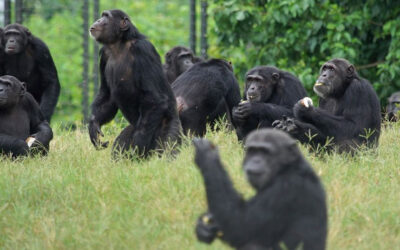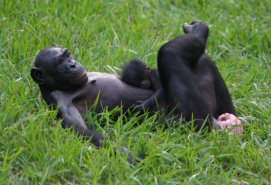Abandoned Chimps in Liberia

After it used and profited from these intelligent animals for decades, NYBC decided the chimps were no longer needed for future research and retired them to small islands near the lab that have no natural food for chimpanzees. NYBC publicly proclaimed their commitment to the lifetime care of the chimpanzees, but walked away from their ethical responsibility when they stopped all funding for the chimpanzees’ care.
Chimps exploited for research and left for dead
Last year, 66 captive chimpanzees in Liberia were abandoned by the New York Blood Center (NYBC)—an organization with assets of $450 million and major corporate partners. The chimpanzees are in danger of dehydration and starvation.
For years, the New York Blood Center used these chimpanzees in medical research, infecting many of them with hepatitis viruses. After living in cages for decades, these chimpanzees do not have the skills to survive in the wild. They are completely reliant on humans for survival, but despite previously committing to the lifetime care of these chimpanzees, NYBC withdrew all funding for the care of the chimpanzees in March 2015. They left these poor chimpanzees to suffer from dehydration and starvation. Local concerned citizens brought food and water to the chimps, but were only able to do so every two days.
After proclaiming their commitment to the lifetime care of the chimpanzees, NYBC walked away from their ethical responsibility.

NYBC is a large American organization that provides blood and develops blood related products, and it also conducts medical research. In the 1970’s, NYBC worked with the Liberian Institute for Biomedical Research to create Vilab II to obtain and breed chimpanzees for use in medical research.
After it used and profited from these intelligent animals for decades, NYBC decided the chimps were no longer needed for future research and retired them to small islands near the lab that have no natural food for chimpanzees. NYBC publicly proclaimed their commitment to the lifetime care of the chimpanzees, but walked away from their ethical responsibility when they stopped all funding for the chimpanzees’ care.
The Pan African Sanctuary Alliance (PASA) is a member of the coalition to save these chimps in Liberia. The coalition has been raising awareness and raising much-needed funds to provide immediate care for the chimps and to establish appropriate facilities to provide for them in the long term.


Watch an emotional video from The Humane Society of the United States
The chimps are now receiving a nutritious diet every day and the water delivery systems for all of the islands have been repaired.
HSUS has hired Jim and Jenny Desmond, a team with wide-ranging expertise in the care, protection and conservation of great apes, to move to Liberia to help develop and implement a plan to give the chimps high quality care. Jim and Jenny’s goal is to establish a proper sanctuary for these chimps which can also be used to rescue and care for other chimpanzees in abusive and inhumane situations in Liberia.
As a major corporate contributor to the New York Blood Center (NYBC), Citigroup was recently approached by the Humane Society of the U.S. to discuss the crisis of the abandoned NYBC chimps in Liberia. Citigroup was admittedly surprised to see their name still on the NYBC page, as they have not contributed for some time now. Despite Citigroup’s attempt to facilitate some positive dialogue between HSUS and NYBC, NYBC continues to turn a blind eye and refuse communication with HSUS.
In April 2016, Citigroup graciously donated $50,000 towards the continued care of the NYBC chimps in Liberia. Citigroup has issued a public statement to publicize the intolerable negligence that has been committed by NYBC.
This is the first major institution that has sent a strong statement as well as a strong message by giving a donation. NYBC has to be feeling the heat! MetLife is THE largest funder of NYBC, but there are many others as well. Let’s hope they will start feeling the pressure to do something themselves if NYBC doesn’t directly.
Caring for the chimpanzees costs tens of thousands of dollars every month. PASA, The Humane Society of the United States, and other coalition members continue to ramp up the efforts to help the chimps.
Next Posts
PASA and the QATO Foundation Partner to Protect Chimpanzees in DRC
PASA and its member J.A.C.K. Sanctuary partner with the QATO Foundation to create a bold new island sanctuary for up to 120 rescued chimpanzees in the DRC.
Trophy Hunting Myths Debunked
NGOs tackle misinformation about trophy hunting spread by the hunting lobby.
Largest Seizure of Monkeys in Africa Welcomed to J.A.C.K. Sanctuary in the Democratic Republic of Congo
Trafficking of African primates from Africa to Asia was thwarted with confiscated animals repatriated and sent to an accredited PASA member sanctuary.
5 Ways to Help Save Gorillas
Anyone can have an impact on gorilla conservation through simple actions.
Celebrate World Parrot Day with PASA!
This World Parrot Day, we are celebrating four of our amazing member sanctuaries that offer a second chance to rescued parrots!
What is an Endangered Species?
This article explains what it means to be “endangered” and explores how human activities can threaten species. It also highlights how Pan African Sanctuary Alliance (PASA) member centers rescue, rehabilitate, and conserve endangered primates and their habitats.
Celebrate 23 Years of PASA in 2023
PASA turns 23! It’s 2023 and we’re asking you to help us celebrate our 23 member sanctuaries and our 23 years of protecting primates. To mark this day, we are launching our Primates Forever Campaign to ensure magnificent great apes and monkeys remain wild and protected.
Viruses in Sanctuary Chimpanzees Across Africa
New research finds that sanctuary chimpanzees are infected with viruses previously found in wild chimpanzees. Additionally, it suggests that, like in the wild, sanctuaries experience reverse zoonotic respiratory virus transmission.
Women in Conservation: Two Wildlife Heroes in West Africa
This International Women’s Day, celebrate the dedication and achievements of two women working to protect wildlife and inspire the next generation in West Africa.
Rewilding Bonobos: 14 Bonobos Return to the Wild
After years of planning and preparation, 14 bonobos are back where they belong in the lush rainforest of equatorial Africa!

